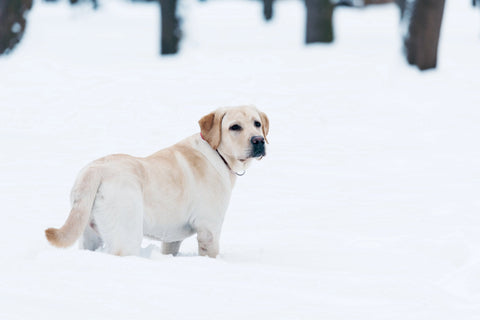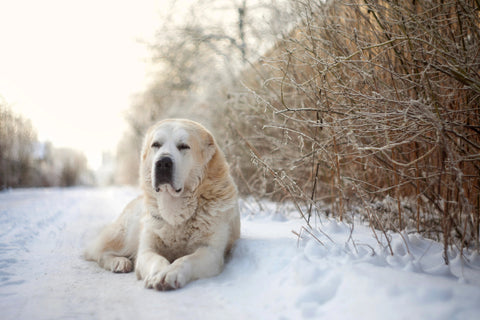Your furbaby may be underweight and this may be because of changes in their daily routines, changes in their dog food or diet, stress, and many other factors.

Being underweight is unhealthy and could greatly jeopardize the health and quality of your dog’s life. You might be asking yourself, “is my dog underweight?” That’s why in this article, we’ll talk about the what being underweight means, how to tell if your dog is underweight, the signs that signal your dog may be underweight, possible reasons, and how to help your furbaby gain their ideal weight.
An underweight dog is a dog weighing below their breed’s ideal weight. If your furbaby appears to be thin and malnourished, you may have a big problem.
How to tell if your dog is underweight?
Determining if your pet is underweight can be identified in many ways. Here are some ways to tell if your dog is underweight.
Profile analysis
- Observe your pet from their side. In an underweight dog, you will see a marked indent between the ribs and the hips.
- Observe your pet from their top. In an underweight dog, you will be able to see clearly the outline of their spine.
According to The Pet Express, a dog with a healthy weight has their abdomen should higher up than their ribcage and their underside will then gradually rise up toward their rear. A steep incline toward the rear indicates that your pet is underweight. Keep in mind that with this method breed can be important in knowing how to tell if a dog is underweight. The recommended way to analyze your furbaby's profile is to make yourself the same level as your dog and view examine from the side.
Rib examination through touch
If you are still wondering, “is my dog underweight?” from looking at them, try a rib examination. Feeling your furbaby's ribs is another great way how to tell if your dog is underweight. You can do this by placing both of your thumbs on your dog's spine and opening your hands over its ribcage. If you are able to feel their ribs without having to press down with little force, then they are likely underweight.
"Being underweight is unhealthy and could greatly jeopardize the health and quality of your dog’s life."
Take into account how much fur your dog has. For example, an underweight German Shepherd Dog could still feel like they have some padding on their ribs due to fur. Try to feel beyond the fur or pat it down to evaluate a potentially underweight German Shepherd Dog. Compared to an underweight German Shepherd, an underweight Dalmation might be much easier for you to notice the ribs. But, by taking the extra fur into account, you will be able to use the same methods of how to tell if a dog is underweight.
Overhead inspection
In an underweight dog, you can visibly see your furbaby's ribs, the outline of their spine, and their waist appearing to be narrower than their ribcage.
Underweight dogs may also display signs such as:
- Lack of energy
- Decreased to no appetite at all (unfinished meals)
- Dullness of skin and coat
If you can easily see that a dog is underweight with an overhead inspection, it might be time to get a high calorie dog food for underweight dogs.
What could be the possible reasons?
As mentioned above, a dog may become underweight for many reasons.
- If your dog gets lost and does not have access to the nutrition for underweight dogs that they need, they can lose weight very quickly.
- If your dog was left alone with a pet sitter in an environment they’re not familiar with for a couple of days, they may feel stressed or anxious and may not feel like eating, causing dramatic weight loss.
- Your dog may be underweight because of certain diseases, like digestive and kidney disorders, parasite infestation, and intestinal worms that may decrease their appetite, hindering them from achieving or maintaining their ideal weight.
- Constant stress is another reason why your dog is underweight. Stress from loud noises, changes in daily routine, new people or pets at home, or stray animals in their territory can cause your dog to gradually lose weight if they encounter these too often.
- Your dog being underweight can also be caused by poor, unhealthy diet that do not provide enough for their daily nutritional and caloric needs.
- Your dog is a picky eater.
Note: For better management and treatment, it's necessary to know the causes of your dog's weight loss. .
What to feed an underweight dog
Now that you know how to tell if your dog is underweight, let’s look at what to feed an underweight dog. The following is a simple guide as to how much you should be feeding your furbaby in different stages of their life and what nutrients they need to prevent them from becoming an underweight dog.
- For puppies. Puppies need a diet that is high in protein and calcium to sustain their growth. Ideally, you should be feeding your pup three times a day until they reach a year old, at which time you may begin feeding them twice a day. But remember that the amount of food you'll have to feed your pup also depends on their weight, daily activities, breed, etc.
- For young adults. When your dog reaches a year old, they are now in their maturity and maintenance stage. This means the nutritional requirements and amount of food will stay almost the same all throughout their entire young adult stage of life (considering they are not sick or goes through daily intense physical activities). Your dog should have a visible waist and you should feel their ribs with your fingers below a small layer of fat.
- For active adults. Exercise is important to all dogs for optimum health and fitness. Dogs who are more active (like those who do sporting activities or are spend most of their times outdoors) need more food and calories to sustain their food requirements, prevent hunger, and fatigue.
- For senior dogs. Your dog's dietary needs will change as they grow older. Senior dogs will have lesser energy requirements and should be fed according to their health condition. Your vet can help you find the best dog food for underweight senior dogs that will fit your pup’s specific needs.
There is no specific guideline on how much you should be giving your dog as all dogs or what to feed an underweight dog. Depending on the dog’s condition and health the answer of what to feed an underweight dog can vary greatly. There are a lot of contributing factors, including age, dog breed, gender, health condition, and lifestyle. But it’s best that you talk to your vet to help you determine your dog’s ideal weight. Here are some tips of properly feeding your dog.
Managing underweight dogs
Managing underweight dogs can be a challenge but we’ve come up with a few efficient approaches to better your furbaby’s weight.
- For an underweight dog, you can usually simply increase the amount of food that you are feeding them. Increase your furbaby's quantity of food in a day. Feed your furbaby a smaller meals couple of times in a day rather than feeding them larger quantities in one feeding.
- In more extreme cases, you will want to turn to a high calorie dog food for underweight dogs. This may be especially helpful when the underweight dog is a picky eater.
- Try a homemade dog food for underweight dogs. Homemade dog food for underweight dogs that you make should be highly nutritious and include all the elements of a balanced dog diet. Make sure that you consult your vet for assistance when developing a recipe for homemade dog food for underweight dogs so that they get all their needed food groups.
- If you are raw feeding your dog, feed them lean meat. Lean meat is healthier and easier to digest.
- If you are feeding your dog commercial kibbles, you can add some of your dog's favorite healthy snacks for added calories and nutrients.
- You can add fruits and veggies, like sweet potato, apples, pumpkin, etc. together with Pet Parents® Probiotic SoftSupps® that are loaded with fiber, vitamins, and minerals that support the digestive tract and promotes proper nutrient absorption. This helps with a proper gut health for your dog.
- To further help meet your furbaby's nutritional needs, you can provide Pet Parents® Multifunctional SoftSupps® that help promote powerful daily health support. Whether it’s to promote skin & coat health, hip & joint support, immune & intestinal function or to help maintain heart health, our dog multivitamin dog supplements have your furbaby covered.
- Provide your dog with fresh water throughout the day to stay well hydrated.
Nutrition for underweight dogs can be a lot of work, but Pet Parents® is your right hand in helping your dog lead a happier and healthier life. Now that you are no longer asking, “is my dog underweight?” you can help your dog gain any weight they need. Follow these tips on how to tell if a dog is underweight and managing an underweight dog. You may want to consult your vet about homemade dog food for underweight dogs or high calorie dog food for underweight dogs. Even a picky dog will appreciate your efforts to keep them healthy and at the proper weight.









